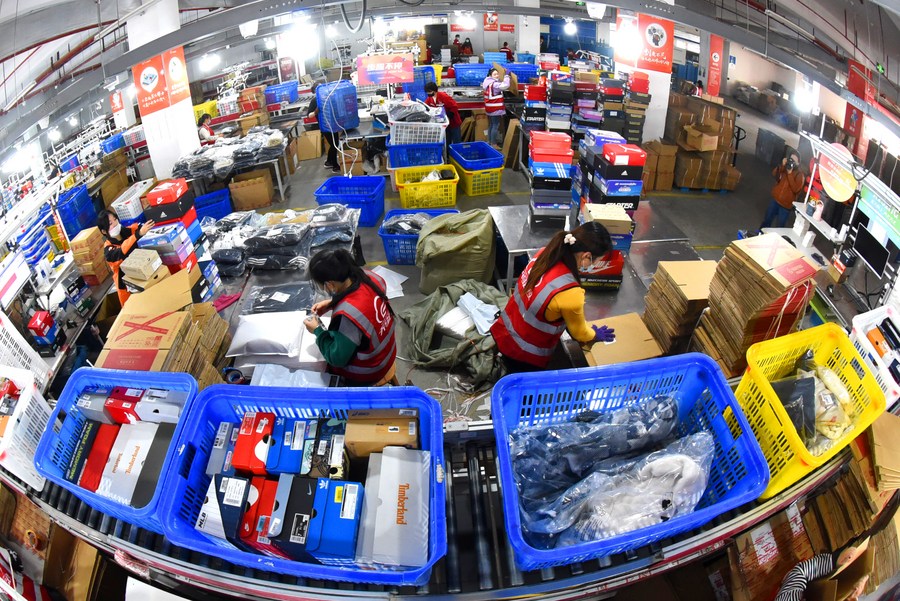China's cross-border e-commerce advances in full swing

Staff members sort packages at an e-commerce industrial park in Lianyungang, east China's Jiangsu Province, Nov. 11, 2022. (Photo by Geng Yuhe/Xinhua)
With improvement of mechanism and the accelerated development of cross-border e-commerce channels, more and more Chinese foreign trade players are advancing along the two-direction way of buying globally and selling globally.
-- Broadening foreign trade channels
Customs data show that in 2022 China's cross-border e-commerce import and export value reached 2.11 trillion yuan, an increase of 9.8 percent year-on-year. Of which, the export value was 1.55 trillion yuan, an increase of 11.7 percent; the import value was 0.56 trillion yuan, an increase of 4.9 percent.
As a new foreign trade mode with fast development speed and strong driving effect, cross-border e-commerce has become a new driving force for transformation, upgrading and high-quality development of China's foreign trade. In recent years, China's cross-border e-commerce pilot zones are playing an increasingly important role in the development of cross-border e-commerce.
The great effort in the development of cross-border e-commerce and other new business models is conducive to stimulating the vitality of foreign trade entities, improving the efficiency of foreign trade operations, stabilizing the industrial and supply chain of foreign trade, and achieving the integration of industrial and trade digitalization.
The State Council has recently approved the establishment of cross-border e-commerce pilot zones in Langfang and other 33 cities and regions, which marks the seventh batch of cross-border e-commerce pilot zones in China, thus expanding the total number of cross-border e-commerce pilot zones in China to 165.
Taking Hangzhou in Zhejiang Province, where the first cross-border e-commerce pilot zone is located, as an example, over the past seven years, Hangzhou has cultivated 49,000 cross-border e-commerce sellers, with more than 2,000 trademarks registered overseas, and the import and export value of cross-border e-commerce exceeding 100 billion yuan.
Today, the cross-border e-commerce pilot zone has become an ecosystem and carrier for the coordinated development of system, management and service innovation, and established six systems of information sharing, financial services, intelligent logistics, e-commerce credibility, statistical monitoring and risk prevention and control, and two platforms of online single window and offline comprehensive parks, effectively helping to stabilize and improve the quality of foreign trade.
-- Selling local products to the world
"Traditional foreign trade relies on waiting for orders from others, and enterprises have no pricing power. Cross-border e-commerce has provided us with opportunities to go global with own brands," said Wu Changhong, an official in charge of cross-border e-commerce comprehensive pilot area of Hangzhou Municipal Commission of Commerce. The essence of cross-border e-commerce is Internet + cross-border trade + Made-in-China, with excellent products and various services, which will help more and more Chinese brands go abroad.
In November 2022, Hangzhou Cross-border E-commerce Pilot Zone launched the Chinese Goods Going Global program, which combines the resources of Hangzhou's key industrial associations and cross-border industry parks to deeply explore excellent sellers from the source of origin, and promote China's high-quality supply to the world through international market insights, merchant training, platform store guidance, and special rights and benefits as incentives.
Under the favorable policies, a group of small and medium-sized Chinese foreign trade enterprises are accelerating their entry into the international market.
"Cross-border e-commerce enterprises have created a flexible supply chain with a fast response by building element clusters to better meet consumers' personalized and customized demands," said a spokesperson from the Ministry of Commerce. Cross-border e-commerce has significantly lowered the threshold of international trade specialization, making a large number of small and micro entities become new operators of the trade. Currently, more than 30,000 companies have been registered on the online comprehensive service platform of China (Hangzhou) Cross-border E-commerce Comprehensive Pilot Area.
-- Buying global products at home
As Made-in-China products are sold well globally, more domestic consumers are also buying globally through cross-border e-commerce channels.
In February this year, the Xiasha Park of Hangzhou Cross-border E-commerce Comprehensive Pilot Area was bustling with cross-border e-commerce packages and transportation, ready to deliver goods to consumers all over the country.
"This year's Spring Festival holiday was much busier than previous years. Our shipping volume increased by 52.3 percent compared to the same period last year, with significant increases in sales of snacks, health products, and small household appliances," said Zhou Dongfang, the head of customs affairs at Hangzhou Haiku Supply Chain Management Co., Ltd.
With increasing convenience of cross-border online shopping, many consumers now purchase foreign goods through cross-border e-commerce import channels. Since JD.com, a Chinese e-commerce giant, launched cross-border fresh food e-commerce, it has been able to deliver global fresh food such as samosas from India, tempura king prawns from Japan and various imported ice creams to Chinese consumers with better quality and faster speed through direct procurement from the country of origin and integration of supply chain resources with large suppliers.
In addition, JD.com's cross-border import e-commerce business has attracted more than 20,000 brands to settle in, covering many categories such as maternal and child products, fashion, nutrition and health care, personal care and beauty makeup, 3C digital products, household items in countries and regions like the United States, Canada, Japan, Australia, New Zealand, France, and Germany as well as many others.
Industry insiders believe that cross-border e-commerce is an innovative practice to expand the import of high-quality foreign products and promote the upgrading of consumption. While enriching the supply of goods, it showcases the cultural characteristics and lifestyles of different countries, allowing domestic consumers to purchase quality goods from around the world without leaving their homes.
- China's Jiangsu welcomes its 1st all-cargo air route to Latin America
- Tianjin's cross-border e-commerce trade tops 5 bln USD in 2023
- China makes solid progress toward goal of becoming a trader of quality: commerce minister
- GLOBALink | Thriving cross-border e-commerce in China's Yinchuan impresses foreign journalists
- China's cross-border e-commerce thrives, delivering global dividends

